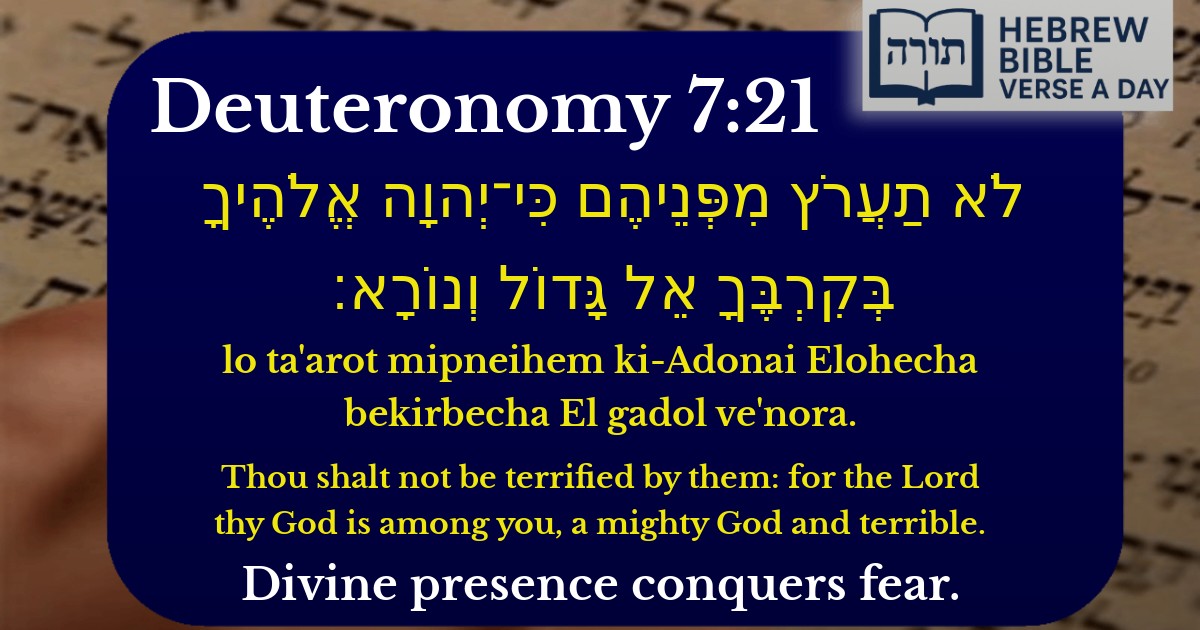Frequently Asked Questions
Q: What does 'Thou shalt not be terrified by them' mean in Deuteronomy 7:21?
A: This verse is instructing the Jewish people not to fear their enemies when entering the Land of Israel. Rashi explains that even though the nations living there were mighty, the Israelites should trust in Hashem's protection, as He is 'among you'—meaning His divine presence would assist them in battle.
Q: Why does the verse call Hashem 'a mighty God and terrible'?
A: The terms 'mighty' (גָּדוֹל) and 'terrible' (נוֹרָא) emphasize Hashem's absolute power and awe-inspiring nature. The Rambam (Hilchot Yesodei HaTorah) teaches that recognizing Hashem's greatness leads to love and fear of Him, reinforcing our trust in His protection and justice.
Q: How can we apply this verse to challenges we face today?
A: Just as the Israelites were told not to fear their enemies because Hashem was with them, we today can draw strength from this message. The Midrash (Sifrei Devarim) teaches that when we uphold Torah and mitzvot, we merit Hashem's protection in all difficulties, reinforcing our faith during hardships.
Q: What does it mean that 'Hashem is among you' in this verse?
A: This phrase means that Hashem's presence dwells with the Jewish people when they are faithful to Him. The Talmud (Berachot 6a) states that wherever ten Jews gather to pray or study Torah, the Shechinah (Divine Presence) rests among them, offering protection and guidance.
Q: Why is this verse important in Jewish thought?
A: This verse reinforces the foundational Jewish belief in bitachon (trust in Hashem). The Chovot HaLevavot (Duties of the Heart) explains that true faith means not letting fear overpower us, as Hashem—who controls all events—is always with those who follow His ways.


Context of the Verse
The verse (Devarim 7:21) appears in Moshe's address to Bnei Yisrael as they prepare to enter Eretz Yisrael. It reassures them not to fear the nations dwelling in the land, emphasizing Hashem's presence and power.
Grammatical and Literal Meaning
The phrase "לֹא תַעֲרֹץ מִפְּנֵיהֶם" ("Do not be terrified by them") uses the verb "תַעֲרֹץ", which Rashi explains as meaning "do not fear" or "do not break down in terror." The term "נוֹרָא" ("terrible") refers to Hashem's awe-inspiring nature, as noted by Ramban, who connects it to His capacity to instill fear in all creation.
Rashi's Commentary
Rashi (Devarim 7:21) emphasizes that the fear of the nations should not enter the hearts of Bnei Yisrael because "ה' אֱלֹהֶיךָ בְּקִרְבֶּךָ" ("Hashem your God is among you"). He explains that this means the Divine Presence dwells with Israel, ensuring their protection. Rashi also links this to the concept of השגחה פרטית (Divine Providence), where Hashem personally oversees their battles.
Rambam's Perspective
In Moreh Nevuchim (3:51), Rambam discusses the nature of fear in the face of adversaries. He explains that true bitachon (trust in Hashem) comes from recognizing that He is "אֵל גָּדוֹל וְנוֹרָא" ("a great and awesome God"), meaning His power transcends all earthly forces. Thus, fear of enemies is unnecessary when one internalizes Hashem's supremacy.
Midrashic Interpretation
The Sifrei (Devarim 53) elaborates on the phrase "בְּקִרְבֶּךָ" ("among you"), teaching that Hashem's presence is not merely external but resides within each individual who upholds the Torah. This aligns with the Talmudic principle (Berachos 6a) that "השכינה שורה על כל אחד מישראל" ("the Divine Presence rests upon every Jew").
Practical Lessons